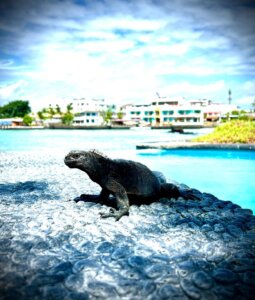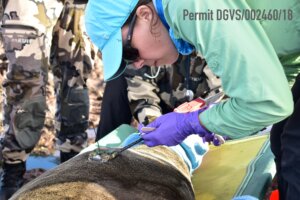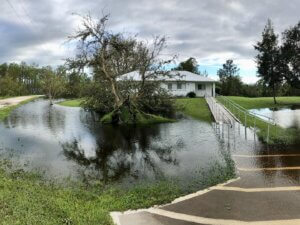Following extreme drought and heat in the Brazilian Amazon rainforest, the SeaWorld Conservation Fund made an emergency grant to the Mamirauá Institute for Sustainable Development (IDSM) to support the rescue of Amazon river dolphins and mitigate the impact of the environmental emergency in and around Lake Tefé, located in the Brazilian Amazon rainforest. Amazon river dolphins, many of a striking pink colour, are a unique freshwater species found only in the rivers of South America and are one of a handful of freshwater dolphin species left in the world. The IDSM is using this grant to further its efforts in recovering dolphin carcasses and gathering biological samples for analyses, with the goal of determining the cause of death. Additionally, IDSM is implementing a comprehensive rescue plan to rescue, treat and translocate healthy dolphins to a more suitable natural habitat.
The SeaWorld Conservation Fund provides grants around the world to grassroots conservation projects that make a difference in species research, habitat protection, conservation education and animal rescue and rehabilitation. Since September 2023, the Amazon river dolphin has been experiencing an Unusual Mortality Event (UME). To date, there have been 154 Amazon river dolphin casualties reported, including both the pink river dolphins and tucuxi dolphins.
“The Mamirauá Institute for Sustainable Development (IDSM) remains a leading force in the drive to prevent the extinction of this rare, endangered species and our fund is privileged to play a part in helping them in this important endeavour,” said Dr. Chris Dold, President of the SeaWorld Conservation Fund and Chief Zoological Officer of SeaWorld.
Extreme Amazon Weather Linked to Hundreds of Dolphins at Risk
IDSM, a research group of Brazil's Ministry of Science, Technology and Innovation, is recognised internationally as a leader in research programs, natural resource management and social development in the Médio Solimões region, state of Amazonas.
The Tefé Dolphins Emergency Operation, launched by the Chico Mendes Institute for Biodiversity Conservation (ICMBio) with technical support from IDSM, monitors the Amazon river dolphins. The operation is divided into three different sectors. The Live Operation sector monitors groups of pink and tucuxi river dolphins along Lake Tefé. When the team finds a dolphin with signs of abnormality, they are able to rescue and transfer to a floating rehabilitation facility. The Dead Animal Monitoring Operation sector aims to identify and search for carcasses in the region and perform necropsies to collect samples for laboratory analysis. The Environmental Operation sector works to monitor water, fish and phytoplankton, organisms composed of microalgae and photosynthetic bacteria.
“Without the SeaWorld Conservation Fund stepping in to support us, we would not have the ability to conduct the research and rescue efforts crucial to protecting Amazon river dolphins,” said Dr. Miriam Marmontel, a researcher and oceanographer at Mamirauá Institute for Sustainable Development. “This grant will make an enormous difference in our conservation efforts, and we couldn’t be more grateful that the SeaWorld Conservation Fund shares as much love and care for preserving the species as we do.”
Since the beginning of the crisis, there have been 154 deceased Amazon river dolphins, with 131 pink river dolphins and 23 tucuxis. Out of this total, 122 animals have undergone necropsies and their tissue and organ samples have been sent to various specialised laboratories across Brazil. Seventeen dolphins have been evaluated with histological analyses, and so far, there is no indication of an infectious agent as the primary cause of death. Molecular diagnostics of 18 dolphins also tested negative for infectious agents, such as viruses and bacteria, associated with mass deaths. Of all the variables analysed so far by experts, the one that has shown discrepant changes is water temperature. The water temperature of Lake Tefé reaches record-high temperatures, ranging from 29°C to 40°C.
The SeaWorld Conservation Fund has granted over $85,000 to assist IDSM in a range of critical efforts, such as travel for sample collection, health assessments, water quality control and essential animal resources, including tents, pools, tools, and medical supplies. The grant also covers expenses related to sample handling, lab analyses, environmental monitoring and animal translocation and importation costs.
About Mamirauá Institute for Sustainable Development
The Mamirauá Sustainable Development Institute was created in April 1999. It is a Social Organisation promoted and supervised by the Ministry of Science, Technology and Innovations. Since the beginning, the Mamirauá Institute has developed its activities through research programs, natural resource management and social development, mainly in the Médio Solimões region, state of Amazonas. The objectives of the Mamirauá Institute include the application of science, technology and innovation in the adoption of strategies and public policies for the conservation and sustainable use of biodiversity in the Amazon. They also cover the construction and consolidation of models for the economic and social development of small riverside communities through the development of socially and environmentally appropriate technologies.



